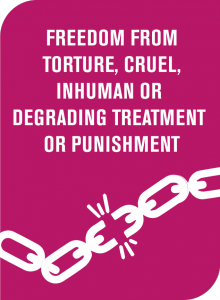
What it means
- African Charter on Human and Peoples Rights (Article 5): Every individual shall have the right to the respect of the dignity inherent in a human being and to the recognition of his legal status. All forms of exploitation and degradation of man, particularly slavery, slave trade, torture, cruel, inhuman or degrading punishment and treatment shall be prohibited.
- American Convention on Human Rights (Article 5): Every person has the right to have his physical, mental, and moral integrity respected. No one shall be subjected to torture or to cruel, inhuman, or degrading punishment or treatment. All persons deprived of their liberty shall be treated with respect for the inherent dignity of the human person. Punishment shall not be extended to any person other than the criminal. Accused persons shall, save in exceptional circumstances, be segregated from convicted persons, and shall be subject to separate treatment appropriate to their status as unconvicted persons. Minors while subject to criminal proceedings shall be separated from adults and brought before specialized tribunals, as speedily as possible, so that they may be treated in accordance with their status as minors. Punishments consisting of deprivation of liberty shall have as an essential aim the reform and social readaptation of the prisoners.
- European Convention on Human Rights and fundamental freedoms (Article 3): No one shall be subjected to torture or to inhuman or degrading treatment or punishment.
- ASEAN Human Rights Declaration: No person shall be subject to torture or to cruel, inhuman or degrading treatment or punishment.
- Arab Charter on Human Rights (Article 8): No one shall be subjected to physical or psychological torture or to cruel, degrading, humiliating or inhuman treatment. Each State party shall protect every individual subject to its jurisdiction from such practices and shall take effective measures to prevent them. The commission of, or participation in, such acts shall be regarded as crimes that are punishable by law and not subject to any statute of limitations. Each State party shall guarantee in its legal system redress for any victim of torture and the right to rehabilitation and compensation.
How it relates to violence against women
The United Nations Special Rapporteur on Torture and the Committee for the Convention against Torture have both acknowledged the devastating impact of VAW and recognized its inclusion into the anti-torture framework. They, along with others, have increasingly recognised the reaction of VAW survivors mirrors the responses of survivors of torture and cruel, inhuman or degrading treatment or punishment. Powerlessness, post-traumatic stress disorder and life-changing physical injuries are just a few of the outcomes which the two groups share. Viewing VAW through this lens makes it clear that the definition of torture includes women’s experiences of gender-based pain and suffering, imposed by states (as in “virginity” tests, and criminalisation of abortion in cases of rape or threat to the health or life of the woman or girl) or where such pain and suffering is facilitated by the state’s failure to act – for example, in the case of domestic violence.
Types of violence against women that violate this right include:
- Widow burning
- Acid throwing
- Virginity testing
Click on the cases to the right (or, for mobile users, at the bottom of this page) to learn more about the right to be free from torture and cruel, inhuman or degrading treatment or punishment and violence against women.
Icon Key




